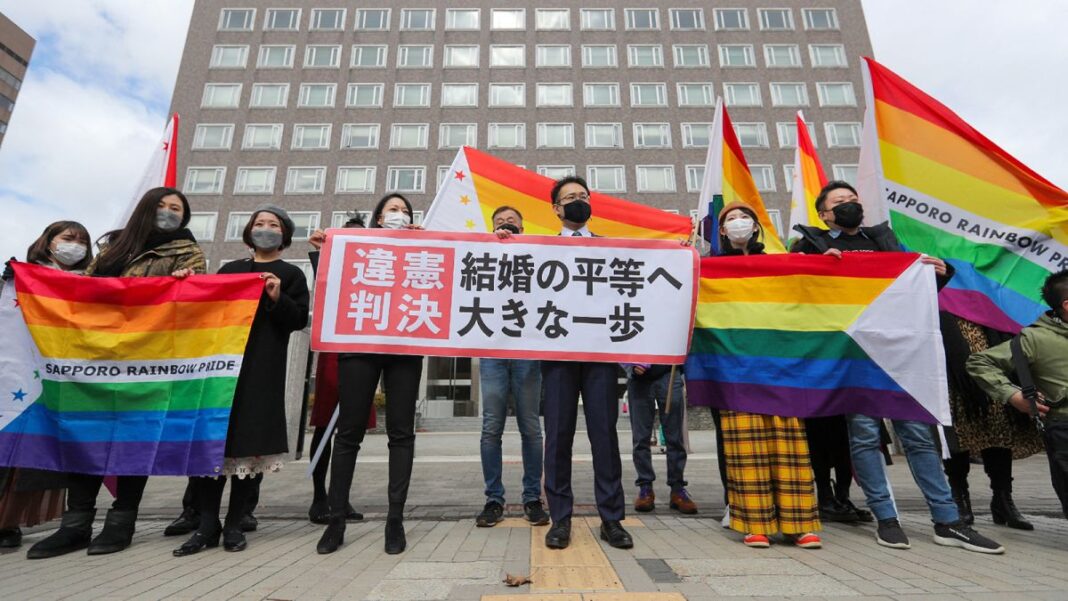Landmark decision from Sapporo court seen as major victory for LGBTQ community with other cases pending.
A Japanese district court on Wednesday ruled that not allowing same-sex couples to marry is “unconstitutional” because it breaches the right to equality, setting a new precedent in the only G7 nation not to fully recognise same-sex unions.
The plaintiffs are among 13 same-sex couples who filed lawsuits on Valentine’s Day in 2019 seeking to force the government to recognise gay marriage.
In the first ruling on the lawsuits, a court in Sapporo turned down a request for damages of one million yen ($9,000) per person for being denied the same legal rights as heterosexual couples.
But the court found that the failure to recognise same-sex marriage was unconstitutional – hailed as a major breakthrough by campaigners.
“I couldn’t hold back my tears. The court sincerely gave its thorough attention to our problem and I think it issued truly a good decision,” a male plaintiff told reporters outside the courthouse.
The couples decided to take legal action after they tried to register their marriages with local authorities in January 2019, but were refused on the grounds that same-sex marriage has no legal status.
Individual municipalities currently issue partnership certificates to help couples with renting places to live and hospital visitation rights but same-sex couples do not have the same legal rights as heterosexual couples. They cannot inherit their partner’s assets – such as the house they may have shared – and nor do they have parental rights to any children their partners may have.
The ruling, the first in Japan on the legality of same-sex marriages, is a considerable symbolic victory.
Issue of equality
At the heart of the lawsuit was the interpretation of marriage in the constitution under Article 24, which stipulates marriage to be based “only on the mutual consent of both sexes and it shall be maintained through mutual cooperation with the equal rights of husband and wife as a basis.”
The plaintiffs’ lawyers argued the article’s intent was to preserve gender equality and individual respect, and did not preclude marriage between same sexes, the Mainichi newspaper reported.
The government, however, has interpreted the article as applying solely to heterosexual couples, and indicated the term “husband and wife” refers to a man and a woman.
By Asian standards, Japanese laws are relatively liberal – homosexual sex has been legal since 1880 – but social attitudes keep the LGBTQ community largely invisible and many have yet to come out even to their families.
Some in the business world say Japan’s not allowing same-sex marriage makes it difficult for companies, especially foreign companies, to attract and keep highly-skilled labour.
The American Chamber of Commerce last year issued a statement saying that Japan’s stance makes it less competitive internationally as a result.
A number of companies have taken their own steps to work around the situation, including international companies and Japanese firms such as Panasonic. But there are limits.
“For things that are part of the national system, such as pensions, there’s nothing they can do,” said Masa Yanagisawa, the head of Prime Services at Goldman Sachs Japan and a board member of the NGO Marriage for All Japan.
“All the other advanced countries have this, so Japan will lose out competitively. Then there’s the fact that people can’t be who they are. It becomes quite business-critical.”













![Hotstar Premium Cookies 2019 [*100% Working & Daily Updated*] Hotstar Premium Cookies 2019 [*100% Working & Daily Updated*]](https://tahav.com/wp-content/uploads/2019/11/Hotstar-Premium-Cookies-Free-100x70.jpg)



